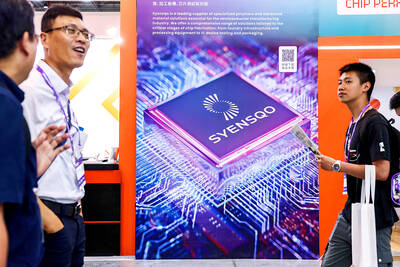AU Optronics Corp (AUO, 友達光電), the nation’s No. 2 LCD panel maker, yesterday said it had signed a memorandum of understanding (MOU) with Toshiba Mobile Display Co to buy a panel plant in Singapore that would enable it to enter the high-end notebook computer and mobile phone businesses.
This is the latest in a string of countermeasures unveiled by the Hsinchu-based flat-panel maker as it competes with Chimei Innolux Corp (奇美電子), allowing AU Optronics to broaden its product portfolio in terms of technologies rather than boosting capacity.
AU Optronics is also seeking to enhance its partnership with TV and PC monitor makers like TPV Technology Ltd (冠捷) to enhance competitiveness.
The company’s board approved a proposal to form a joint TV assembling venture with TPV in Poland, investing a combined US$40 million (US$1.27 million) initially.
Based on the MOU with Toshiba Mobile, AU Optronics would purchase 100 percent of the shares in AFPD Pte Ltd, a subsidiary of Toshiba Mobile Display in Singapore and a leading manufacturer of LCD panels based on low- temperature polysilicon (LTPS) technology.
“AU Optronics’ competence in the high-end display market is further strengthened by AFPD’s fab capacity, talented workforce and technologies,” chief executive Chen Lai-juh (陳來助) said in the joint statement.
“The acquisition could also help place AU Optronics in a special strategic position in slim notebooks and smart phones for high-end markets and new application markets such as tablet PCs,” Chen said.
The companies are scheduled to sign an agreement by the end of this month.
No financial details were disclosed yesterday, though speculation the acquisition might cost AU Optronics ¥10 billion (US$108 million) was dismissed.
“The deal will help AU Optronics obtain [more advanced] LTPS technologies and help it make the ultra-slim screens used in premium laptops and handsets, an area in which Chi Mei Innolux is weak,” said David Hsieh (謝勤益), a vice president of market researcher DisplaySearch.
Toshiba Mobile supplies ultra-slim screens from the Singaporean plant to laptop computer makers including the world’s No. 3 PC maker Dell Inc, Sony Corp and Lenovo Group, Hsieh said.
The plant ships 1 million notebook panels a month mostly tailor-made, he said.
After the transaction, AU Optronics may own the factory utilities, equipment, workforce and patents.
Toshiba Mobile is also planning to continue using the capacity for its customers, AU Optronics spokesperson Hsiao Ya-wen (蕭雅文) said by phone.
AFPD’s G4.5 fab — the latest generation fab capable of producing LTPS — has a capacity of approximately 45,000 sheets per month, the statement said.
AU Optronics currently operates a 3.5G LTPS plant in Taiwan.
The acquisition of AFPD in Singapore adds a new manufacturing base in Asia to AU Optronics’ existing units in Taiwan and China.
The new site would hopefully be able to serve high-end display markets in South Asia, the Middle East, Australia and New Zealand, the statement said.
The share price of AU Optronics rose 0.28 percent to NT$36.1, out-performing the TAIEX, which dropped 0.53 percent yesterday. Chi Mei Innolux shares fell 1.42 percent to NT$48.45.

SEMICONDUCTOR SERVICES: A company executive said that Taiwanese firms must think about how to participate in global supply chains and lift their competitiveness Taiwan Semiconductor Manufacturing Co (TSMC, 台積電) yesterday said it expects to launch its first multifunctional service center in Pingtung County in the middle of 2027, in a bid to foster a resilient high-tech facility construction ecosystem. TSMC broached the idea of creating a center two or three years ago when it started building new manufacturing capacity in the US and Japan, the company said. The center, dubbed an “ecosystem park,” would assist local manufacturing facility construction partners to upgrade their capabilities and secure more deals from other global chipmakers such as Intel Corp, Micron Technology Inc and Infineon Technologies AG, TSMC said. It

People walk past advertising for a Syensqo chip at the Semicon Taiwan exhibition in Taipei yesterday.

NO BREAKTHROUGH? More substantial ‘deliverables,’ such as tariff reductions, would likely be saved for a meeting between Trump and Xi later this year, a trade expert said China launched two probes targeting the US semiconductor sector on Saturday ahead of talks between the two nations in Spain this week on trade, national security and the ownership of social media platform TikTok. China’s Ministry of Commerce announced an anti-dumping investigation into certain analog integrated circuits (ICs) imported from the US. The investigation is to target some commodity interface ICs and gate driver ICs, which are commonly made by US companies such as Texas Instruments Inc and ON Semiconductor Corp. The ministry also announced an anti-discrimination probe into US measures against China’s chip sector. US measures such as export curbs and tariffs

The US on Friday penalized two Chinese firms that acquired US chipmaking equipment for China’s top chipmaker, Semiconductor Manufacturing International Corp (SMIC, 中芯國際), including them among 32 entities that were added to the US Department of Commerce’s restricted trade list, a US government posting showed. Twenty-three of the 32 are in China. GMC Semiconductor Technology (Wuxi) Co (吉姆西半導體科技) and Jicun Semiconductor Technology (Shanghai) Co (吉存半導體科技) were placed on the list, formally known as the Entity List, for acquiring equipment for SMIC Northern Integrated Circuit Manufacturing (Beijing) Corp (中芯北方積體電路) and Semiconductor Manufacturing International (Beijing) Corp (中芯北京), the US Federal Register posting said. The